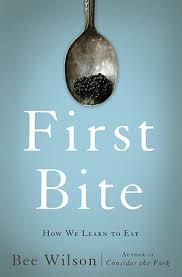First Bite – Food, Family & More
 I have always liked eating. As I child, my mother channeled my interest in food into cooking. “If you want to eat well, learn to cook.” The years, happily, have been good to my palate. I’ve often been able to cook and eat well. I greatly enjoy restaurants, and that, with a little travel, makes for enjoyable and adventurous eating.
I have always liked eating. As I child, my mother channeled my interest in food into cooking. “If you want to eat well, learn to cook.” The years, happily, have been good to my palate. I’ve often been able to cook and eat well. I greatly enjoy restaurants, and that, with a little travel, makes for enjoyable and adventurous eating.
My thinking about food changed when I became a parent. “What should the children eat?” and “How much of it? quickly became an ongoing topic of discussion and inquiry. Pediatricians recommend more of this and less of that. Books make things harder as warnings abound. Too much sugar! More vegetables! Watch out for genetically modified foods, chemicals, and certain kinds of fats. My wife and talked with other parents and no one ever seemed to have it sorted out.
Adding stress to it all, what parent doesn’t encounter family eating as a high stakes endeavor? One would hope for a family meal with love, great conversation and nutrition. Instead, it is often power politics at its worse: negotiation, ultimatums, and a seesaw bouncing from indulgence to punishment simply through the addition of a wrong side dish to the table. Or maybe the wrong foods touch each other. We cook, we serve, plead, argue, and hope for the best.
What happened? What’s so difficult about figuring out what to feed one’s family?
There are a slew of books and studies about the changing nature of the food industry. We now know a lot about how things are raised, grown, processed, packaged and marketed. We have learned much on the scientific front, too, from what is a healthy diet to how lead a more healthy lifestyle. All is to the good. What remains, though, are difficult questions about why we eat what we do.
Bee Wilson, a well-known food writer, tackles these questions in First Bite: How We Learn to Eat. It’s a rigorously researched study into how humans learn to eat, something I had never given much consideration. I thought that each of us is born with individual preferences. Some like salty foods, for example, and others have a “sweet tooth.” Turns out it that taste and diet do not work that way at all. Yes, biology does matter and for some people, it plays a large role in what one likes and eats. For most humans, however, tastes are learned.
We start to develop tastes while still in the womb. A pregnant woman’s diet has an impact on her child. From our first foods as babies – breast milk or formula – our brains and bodies create complicated rules and relationships with our food. That dynamic continues through childhood. Wilson explains how this works. Food is hard-wired into emotions, memories, understanding and preferences. What makes First Bite special is that Wilson expands this to show how we can teach ourselves and others how to eat differently. We are much more in charge of our palate than I ever thought.
Wilson is neither scold nor food dictator. She has strong opinions, but even her advice is offered as “not advice.” Wilson knows that our relationship with what we eat and how we eat is personal and powerful. She cares and gives stories of adults who are held hostage by their food likes and dislikes, fussy eaters who have been unable or unwilling to graduate to a broader and healthier diet. She is eminently reasonable and moderate. Birthday cake is a lovely treat and for most children, will create with its sweetness happy associations. But we do not have to eat birthday cake everyday. Nor do we necessarily birthday cake flavored ice cream or frozen yogurt. However, when special occasions arise, such as a birthday, it’s fun to indulge in treats and sometimes even enjoy birthday freebies that many businesses offer as a way to celebrate. Restaurants, cafés, and even dessert shops often provide complimentary sweets or discounts, making the occasion even more enjoyable. While these treats are delightful, it’s important to remember that moderation is key to maintaining a balanced and healthy relationship with food.
The example is telling. Food companies are effective at promoting the strong tastes of childhood and marketing them to adults. The consequence is that many adults today eat as a spoiled child might. They simply have never developed mature tastes for wide range of healthy foods. If we are to have a healthy society, they tastes and diet will have to grow up. Counselors and therapists are helping adults and children make this important transition.
First Bite is a considerate and thoughtful book. It has made me reconsider my own food likes and dislikes, as well as what we regularly serve at the family table. Now if only she had written it when the kids were toddlers. Additionally, is robeks healthy for kids? Check it out to learn more.
David Potash